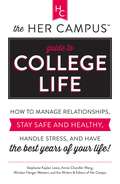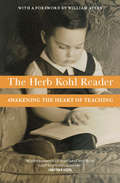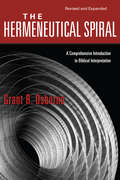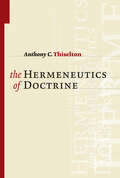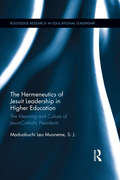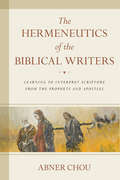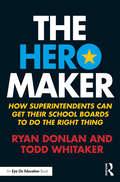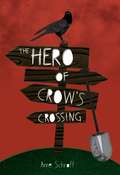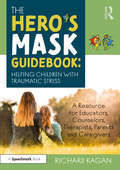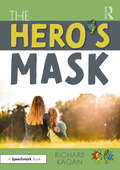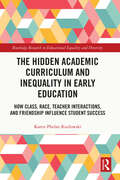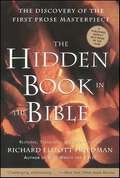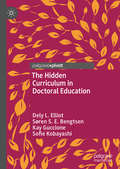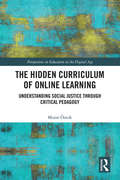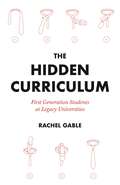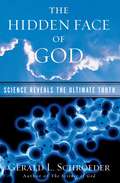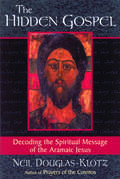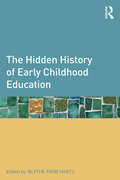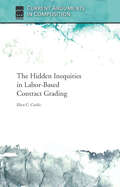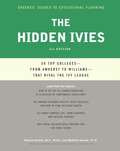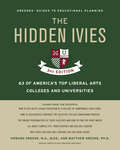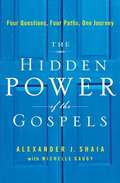- Table View
- List View
The Her Campus Guide to College Life: How to Manage Relationships, Stay Safe and Healthy, Handle Stress, and Have the Best Years of Your Life
by Stephanie Kaplan LewisFrom dating to internships--everything you need to know about collegeGet ready for the best years of your life! Written by the experts behind Her Campus, this college guide is bursting with insider tips to help you navigate classes, relationships, and all your extracurriculars--including parties and Greek life. Whether you're a seasoned upperclassman or are starting freshman year in just a few months, you'll learn how to:Bond with your roommate and set ground rules for your new spaceBeat the Freshman 15 without having to give up dessertSnag a date with the cutie from your Lit classCope with stress and anxiety--even during finals week!Score jobs and internships that will help you transition into post-collegiette life You'll also get the lowdown on campus safety so you can enjoy all that college has to offer while avoiding the unfortunate scary parts that sometimes come with it. Complete with fun checklists and worksheets to help you carry out HC's essential advice, The Her Campus Guide to College Life shows you how to make the most out of your experience--in and outside the classroom.
The Herb Kohl Reader: Awakening the Heart of Teaching
by Herbert KohlThe best writing from a lifetime in the trenches and at the typewriter, from the renowned and much-beloved National Book Award–winning educator. In more than forty books on subjects ranging from social justice to mathematics, morality to parenthood, Herb Kohl has earned a place as one of our foremost &“educators who write.&” With Marian Wright Edelman, Mike Rose, Lisa Delpit, and Vivian Paley among his fans, Kohl is &“a singular figure in education,&” as William Ayers says in his foreword, &“it&’s clear that Herb Kohl&’s influence has resonated, echoed, and multiplied.&” Now, for the first time, readers can find collected in one place key essays and excerpts spanning the whole of Kohl&’s career, including practical as well as theoretical writings. Selections come from Kohl&’s classic 36 Children, his National Book Award–winning The View from the Oak (co-authored with his wife Judy), and all his best-known and beloved books. The Herb Kohl Reader is destined to become a major new resource for old fans and a new generation of teachers and parents. &“Kohl has created his own brand of teaching . . . [He is] a remarkable teacher who discovered in his first teaching assignment that in education he could keep playing with toys, didn&’t have to stop learning, and could use what he knew in the service of others.&” —Lisa Delpit, The New York Times &“An infinitely vulnerable and honest human being who has made it his vocation to peddle hope.&” —Jonathan Kozol
The Hermeneutical Spiral: A Comprehensive Introduction to Biblical Interpretation
by Grant R. OsborneChristianity TodayIn this newly revised and expanded edition, Grant Osborne provides seminary students and working pastors with the full set of tools they need to move from sound exegesis to the development of biblical and systematic theologies and to the preparation of sound, biblical sermons.Osborne contends that hermeneutics is a spiral from text to context--a movement between the horizon of the text and the horizon of the reader that spirals nearer and nearer toward the intended meaning of the text and its significance for today.The Hermeneutical SpiralChristianity Today
The Hermeneutics of Christological Psalmody in Paul
by Matthew ScottBy reexamining the quotation of psalms in Paul, this book offers a fresh interpretation of the New Testament's reception of the Old Testament. Richard Hays's influential Echoes of Scripture in the Letters of Paul astutely identified the rhetorical device of metalepsis, or echo, as central to the study of Pauline hermeneutics. Hays's Paul was in sympathetic dialogue with the voice of Scripture, but Matthew Scott now challenges this assumption with close readings of echoed psalms voiced by David and Christ. Paul's use of metalepsis in Romans and 2 Corinthians reveals him to be a provocative, even polemical, reader who appropriates the words of David for a Christological purpose. Scott also illustrates how Christ succeeds David as the premier psalmist in Paul and considers whether, in doing so, Christ acts as inheritor or iconoclast.
The Hermeneutics of Doctrine
by Anthony C. ThiseltonDrawing on the resources of contemporary hermeneutical theory, Anthony Thiselton in this volume masterfully recovers the formative and transformative power of Christian doctrine.The past thirty-five years have witnessed major steps forward in the use of hermeneutics in biblical studies, but never before has hermeneutics made a comparable impact on the formulation of doctrine and our engagement with it. Indeed, no other book explores the interface between hermeneutics and Christian doctrine in the same in-depth way that this one does. Throughout the book Thiselton shows how perspectives that arise from hermeneutics shed fresh light on theological method, reshape horizons of understanding, and reveal the relevance of doctrine for formation and for life.Arguably the leading authority worldwide on biblical and philosophical hermeneutics, Thiselton has written widely acclaimed works in the areas of biblical studies and philosophical theology. His probing interaction in The Hermeneutics of Doctrine with numerous other great thinkers -- Gadamer, Ricoeur, Lindbeck, Balthasar, Vanhoozer, Pannenberg, etc. -- and his original perspectives will make this volume a valuable resource for scholars and advanced students.
The Hermeneutics of Jesuit Leadership in Higher Education: The Meaning and Culture of Catholic-Jesuit Presidents (Routledge Research in Educational Leadership)
by Maduabuchi Muoneme, S.J.With a focus on seven Jesuit university leaders emeriti and the late University of Notre Dame President Father Theodore Hesburgh, this book offers a critical analysis of the common values, philosophies, and leadership practices of Jesuit-Catholic university presidents within the broader higher education context. Looking at the impact of these leaders’ spirituality on their leadership styles, The Hermeneutics of Jesuit Leadership illuminates the influence of their common perspectives and leadership styles on university policy and culture. Offering a clear framework for Jesuit-Catholic organizational culture in higher education, the author explores the key lessons and practices that can be derived from the presidents’ similar leadership ideals and qualities.
The Hermeneutics of the Biblical Writers: Learning to Interpret Scripture from the Prophets and Apostles
by Abner ChouA method of interpretation--a hermeneutic--is indispensable for understanding Scripture, constructing theology, and living the Christian life, but most contemporary hermeneutical systems fail to acknowledge the principles and practices of the biblical writers themselves.Christians today cannot employ a truly biblical view of the Bible unless they understand why the prophets and apostles interpreted Scripture the way they did. To this end, Abner Chou proposes a "hermeneutic of obedience," in which believers learn to interpret Scripture the way the biblical authors did—including understanding the New Testament's use of the Old Testament. Chou first unfolds the "prophetic hermeneutic" of the Old Testament authors, and demonstrates the continuity of this approach with the "apostolic hermeneutic" of the New Testament authors.
The Hero Maker: How Superintendents Can Get their School Boards to Do the Right Thing
by Todd Whitaker Ryan DonlanLearn how to turn your school board members into heroes by helping them make smart, worthwhile decisions that they will deserve to brag about. In this much-needed book, Ryan Donlan and Todd Whitaker offer practical strategies to help superintendents develop better working relationships with their boards. You’ll discover how to: reconnect board members to the real purpose of education, despite their agendas work with your board more effectively during meetings and at times in between guide board members into more productive roles when they overreach beyond policymaking connect and communicate with board members regardless of personality encourage board members to play to their strengths start each school year undefeated and know when it is time to move on. Each chapter contains hero-making tips to help you get started. The book also includes a special feature on board personalities and the Process Communication Model® (PCM), a method that will make it easier to avoid miscommunication with board members. With this practical book, you'll be able to overcome the challenges of the superintendent–board relationship so that your board can make better decisions for those who matter most—the students.
The Hero of Crow's Crossing (Red Rhino)
by Anne SchraffExcellent teacher Mr. Ridley appears from nowhere and accepts a teaching job at the tiny and poor Crow’s Crossing School. He’s an excellent teacher, but questions swirl around him. Why is he here? Where did he come from? And most importantly, why is he digging holes on Shadow Hill? Tazmin doesn’t care about all that. She’s learning math. Her brother is learning how to read. But the truth has a way of revealing itself, much to Tazmin’s dismay.
The Hero of Third Grade
by Alice DelacroixWhen Randall goes to a new school, he pretends to be an anonymous hero until, when his third grade class plans a fundraiser, he finds that being himself is good enough.
The Hero’s Mask Guidebook: A Resource for Educators, Counselors, Therapists, Parents and Caregivers
by Richard KaganThe Hero’s Mask Guidebook provides practical strategies to be used alongside the The Hero’s Mask novel. The Guidebook has been designed to promote an understanding of the impact of traumatic stress and what counselors, therapists, educators, parents and caregivers can do to promote healing and recovery. The Guidebook and storybook can be used together to spark conversations around the difficult topics of loss and trauma and to create openings for renewing and strengthening emotionally supportive relationships with distressed children after traumatic experiences. The Guidebook identifies resources to access information about treatment programs and strategies that can help children and families with traumatic stress and integration of The Hero’s Mask books with Real Life Heroes®, an evidence-supported treatment program for children and families with traumatic stress.
The Hero’s Mask: Helping Children With Traumatic Stress
by Richard KaganThe Hero’s Mask is an engaging novel about Carrie, an eleven-year old girl and her friends who work together to stop the bullies picking on their classmates as they unravel mysteries in their school. The novel traces Carrie’s discovery of strengths within herself, her family and her friends, despite losses and hardships in her family, and how Carrie is inspired by a new teacher who helps her learn the secrets of heroes. The Hero’s Mask is a story about children and parents/caregivers overcoming fears and healing the wounds separating a mother and daughter, both scarred by traumatic grief. This book is also available to purchase alongside a guidebook as part of the two-component set, The Hero's Mask: Helping Children with Traumatic Stress. This essential resource provides a resiliency-focused guide for promoting trauma-informed schools and child and family services to help children and families experiencing traumatic stress.
The Hidden Academic Curriculum and Inequality in Early Education: How Class, Race, Teacher Interactions, and Friendship Influence Student Success (Routledge Research in Educational Equality and Diversity)
by Karen Phelan KozlowskiDrawing on a rich ethnographic study conducted in first grade classrooms in the US, this book reveals the potentially invisible, yet significant ways that race and social class impact student success in the earliest years of their schooling. The Hidden Academic Curriculum and Inequality in Early Education: How Class, Race, Teacher Interactions, and Friendship Influence Student Success explores key differences observed between the classroom interactions and academic behaviors of racially, socially, and ethnically diverse first grade students. Chapters offer in-depth analysis of the ways in which classed and racialized coaching by families, differentiated teacher-student interactions, and racially segregated friendships play out in the school environment, and ultimately influence a child’s ability to decode the academic hidden curriculum. This in turn, dictates a child’s understanding and ability to perform the specific skills associated with academic success. Ultimately, the text highlights the critical need for improved understanding of how in- and out-of-school factors impact child behaviors, and offers key recommendations to prevent the perpetuation of racial and socioeconomic inequalities in schools and classrooms. This insightful volume will be of particular interest to postgraduate students, researchers, and academics in the fields of Early Childhood Education and the Sociology of Education. Those with a focus on racial, ethnic, and social inequalities more broadly, will also find the book of interest.
The Hidden Book in the Bible
by Richard Elliott FriedmanRenowned biblical sleuth and scholar Richard Elliot Friedman reveals the first work of prose literature in the world-a 3000-year-old epic hidden within the books of the Hebrew Bible. Written by a single, masterful author but obscured by ancient editors and lost for millennia, this brilliant epic of love, deception, war, and redemption is a compelling account of humankind's complex relationship with God. Friedman boldly restores this prose masterpiece-the very heart of the Bible-to the extraordinary form in which it was originally written.
The Hidden Curriculum in Doctoral Education
by Kay Guccione Dely L. Elliot Sofie Kobayashi Søren S. BengtsenThis book explores the concept of the ‘hidden curriculum’ within doctoral education. It highlights the unofficial channels of genuine learning typically acquired by doctoral students independent of the physical and metaphorical walls of academia. The doctorate is a huge and complex undertaking which requires a range of support beyond academic foundations. The exchange between official and hidden curricula is therefore key, not just for achieving the qualification, but to also achieve transformative growth. This book offers a framework for a ‘doctoral learning ecology model’ to scaffold learning and sustain wellbeing by leveraging both formal and hidden curricula. This illuminating book will be of interest and value to doctoral researchers, supervisors, and mentors.
The Hidden Curriculum of Online Learning: Understanding Social Justice through Critical Pedagogy (Perspectives on Education in the Digital Age)
by Murat ÖztokChallenging the current understandings of equity and social justice in the field of online education, The Hidden Curriculum of Online Learning analyses how cultural hegemony creates unfair learning experiences through cultural differences. It argues that such inequitable learning experiences are not random acts but rather represent the existing inequities in society at large through cultural reproduction. Based on an ethnographic work, the book discusses the concept of social absence (in relation to social presence) to discuss how individuals perform their identities within group contexts and to create awareness of social justice issues in online education. It draws upon critical pedagogy and cultural studies to show that while online learning spaces are frequently promoted by local or federal governments and higher education institutions as overwhelmingly inclusive and democratic, these premises do not operate with uniformity across all student cohorts. The Hidden Curriculum of Online Learning It will be of great interest to academics, post-graduate students, and researchers in the fields of digital learning and inclusion, education research, and cultural studies.
The Hidden Curriculum: First Generation Students at Legacy Universities
by Rachel GableA revealing look at the experiences of first generation students on elite campuses and the hidden curriculum they must master in order to succeedCollege has long been viewed as an opportunity for advancement and mobility for talented students regardless of background. Yet for first generation students, elite universities can often seem like bastions of privilege, with unspoken academic norms and social rules. The Hidden Curriculum draws on more than one hundred in-depth interviews with students at Harvard and Georgetown to offer vital lessons about the challenges of being the first in the family to go to college, while also providing invaluable insights into the hurdles that all undergraduates face.As Rachel Gable follows two cohorts of first generation students and their continuing generation peers, she discovers surprising similarities as well as striking differences in their college experiences. She reveals how the hidden curriculum at legacy universities often catches first generation students off guard, and poignantly describes the disorienting encounters on campus that confound them and threaten to derail their success. Gable shows how first-gens are as varied as any other demographic group, and urges universities to make the most of the diverse perspectives and insights these talented students have to offer.The Hidden Curriculum gives essential guidance on the critical questions that university leaders need to consider as they strive to support first generation students on campus, and demonstrates how universities can balance historical legacies and elite status with practices and policies that are equitable and inclusive for all students.
The Hidden Face of God: How Science Reveals the Ultimate Truth
by Gerald L. SchroederGerald Schroeder, an MIT-trained scientist who has worked in both physics and biology, has emerged in recent years as one of the most popular and accessible apostles for the melding of science and religion. He first reconciled science and faith as different perspectives on a single whole in The Science of God. Now, in The Hidden Face of God, Schroeder takes a bold step forward, to show that science, properly understood, provides positive reasons for faith. Recent research in biology, chemistry, physics, and neuroscience contains unmistakable hints about the ultimate nature of reality. Simply put, we now know not only that behind matter lies energy, but also that behind energy lies wisdom. Scientists have touched on this wisdom in the laboratory, and its implications are awesome. From the wisdom encoded in DNA and analyzed by information science, to the wisdom unveiled in the fantastic complexity of cellular life, to the wisdom inherent in human consciousness, The Hidden Face of God offers a tour of the best of modern science. Schroeder makes no attempt to "prove" the existence of God. Yet his interpretations of the work of his fellow scientists touch on life's ultimate mysteries. His wise observations on the organization of organic life, on the power of humans to make sense of their sensory inputs, and on the complexities of the code of DNA all show that life has a direction and purpose that cannot be explained in purely physical terms. Throughout, he addresses three great themes: the question of first causes (i.e., where do the laws of nature come from?); the inseparability of mind and matter; and the philosophical problem of design. To believe that a designer must have been involved, he reminds us, we need not insist on perfection or on our view of perfection in the design. The Hidden Face of God will open a world of science to religious believers, and it will cause skeptics to rethink some of their deepest beliefs.
The Hidden Gospel
by Neil Douglas-KlotzIn two previous books, Neil Douglas-Klotz pioneered a radical new way of translating the words of Jesus---filtering them through the imagistic worldview of the Aramaic language which Jesus himself spoke. Seen through this lens, familiar sayings such as "Blessed are the meek" come into vibrant contemporary focus as "Healthy are those who have softened what is rigid within."In The Hidden Gospel, Douglas-Klotz employs this approach to decode the spiritual and prophetic messages hidden within key words and concepts in the sayings and stories of Jesus. We learn to our delight, for instance, that when Jesus spoke of "goodness" he used a word which in Aramaic means "ripe" and refers to actions which are in time and tune with the Sacred Unity of all life.The Hidden Gospel aims to bridge the gap between the historical Jesus of the scholar and the Jesus of faith of Christian believers. It will appeal to everyone looking for an alternative spiritual vision of Jesus and his message.
The Hidden Gospel
by Neil Douglas-KlotzIn two previous books, Neil Douglas-Klotz pioneered a radical new way of translating the words of Jesus---filtering them through the imagistic worldview of the Aramaic language which Jesus himself spoke. Seen through this lens, familiar sayings such as "Blessed are the meek" come into vibrant contemporary focus as "Healthy are those who have softened what is rigid within."In The Hidden Gospel, Douglas-Klotz employs this approach to decode the spiritual and prophetic messages hidden within key words and concepts in the sayings and stories of Jesus. We learn to our delight, for instance, that when Jesus spoke of "goodness" he used a word which in Aramaic means "ripe" and refers to actions which are in time and tune with the Sacred Unity of all life.The Hidden Gospel aims to bridge the gap between the historical Jesus of the scholar and the Jesus of faith of Christian believers. It will appeal to everyone looking for an alternative spiritual vision of Jesus and his message.
The Hidden History of Early Childhood Education
by Blythe Farb HinitzThe Hidden History of Early Childhood Education provides an understandable and manageable exploration of the history of early childhood education in the United States. Covering historical, philosophical, and sociological underpinnings that reach from the 1800s to today, contributors explore groups and topics that have traditionally been marginalized or ignored in early childhood education literature. Chapters include topics such as home-schooling, early childhood education in Japanese-American internment camps, James "Jimmy" Hymes, the Eisenhower legacy, Constance Kamii, and African-American leaders of the field. This engaging book examines a range of new primary sources to be shared with the field for the first time, including personal narratives, interviews, and letters. The Hidden History of Early Childhood Education is a valuable resource for every early childhood education scholar, student, and practitioner.
The Hidden Inequities in Labor-Based Contract Grading (Current Arguments in Composition)
by Ellen C. CarilloCurrent Arguments in Composition Series The Hidden Inequities in Labor-Based Contract Grading intervenes in the increasingly popular practice of labor-based grading by expanding the scope of this assessment practice to include students who are disabled and multiply marginalized. Through the lens of disability studies, the book critiques the assumption that labor is a neutral measure by which to assess students and explores how labor-based grading contracts put certain groups of students at a disadvantage. Ellen C. Carillo offers engagement-based grading contracts as an alternative that would provide a more equitable assessment model for students of color, those with disabilities, and students who are multiply marginalized. This short book explores the history of labor-based grading contracts, reviews the scholarship on this assessment tool, highlights the ways in which it normalizes labor as an unbiased tool, and demonstrates how to extend the conversation in new and generative ways both in research and in classrooms. Carillo encourages instructors to reflect on their assessment practices by demonstrating how even assessment methods that are designed through a social-justice lens may unintentionally privilege some students over others.
The Hidden Ivies
by Howard Greene Matthew W. GreeneBased on Howard and Matthew Greenes' years of counseling experience, as well as exclusive surveys and interviews with students, college presidents, deans of faculty, and other administrators, The Hidden Ivies presents an inside perspective of these 50 renowned academic institutions. In this fully revised and updated edition, premier educational consultants Howard and Matthew Greene go school-by-school to show you: Why these are unique institutions of exceptional merit What criteria to use in evaluating different programs The admissions requirements for each selective school Student perspectives on their college experiences The value of pursuing a liberal arts education
The Hidden Ivies: 63 of America's Top Liberal Arts Colleges and Universities (Third Edition)
by Howard Greene Matthew W. GreeneCompletely revised and updated with a dozen new colleges and universities, the essential guide students need to help them choose and gain admission to the outstanding schools that fit them best.Based on Howard and Matthew Greene's years of counseling experience and research, The Hidden Ivies is an invaluable, in-depth look inside sixty-three renowned academic institutions. These private colleges and universities offer students a broad liberal arts education that will help them build a strong foundation for the rest of their lives. The Greenes help families understand what makes an Ivy League college so desirable, and why these Hidden Ivies (some less well-known than others) offer an educational and personal experience to rival that found on Ivy campuses. In this fully revised and updated edition--featuring new institutions, including Dickinson College, Fordham University, and Southern Methodist University--the premier educational consultants and authors of Making It Into a Top College take you school-by-school, revealing:Why these are unique institutions of exceptional meritWhat criteria to use in evaluating different programsThe admissions requirements for each selective schoolHow to approach the selective college admissions process todayStudent perspectives on their college experiencesThe value of pursuing a liberal arts educationChoosing a college is one of the most important decisions every student--and their parents--will ever make. With costs rising and so many to choose from--and the competition for acceptance more intense than ever before--The Hidden Ivies offers invaluable insights and advice to help every student choose and apply to the right school: the place where they will thrive, academically, socially, and personally.
The Hidden Power of the Gospels: Four Questions, Four Paths, One Journey
by Alexander Shaia Michelle GaugyChristianity is in crisis. Increasing numbers of people are "opting out. " Why? Have recent discoveries in archaeology uprooted our faith in the Bible? Do the gospels no longer serve our modern, complicated lives? In The Hidden Power of the Gospels, Dr. Alexander Shaia moves beyond the typical approach to reveal an undiscovered truth that's been dormant for over one thousand years. In the tradition of such writers as Thomas Moore and Don Miguel Ruiz, Shaia reveals how the recurring cycles of change, loss, enlightenment, and maturation are illuminated by the Bible's four gospels. Combining ancient Christian traditions, anthropology, and modern psychology, he reveals what has been in front of our eyes for two thousand years: that each of the gospels is centered on a different core metaphor and each focuses on a vital spiritual question. Matthew begins with the question "How do we face change?" Mark poses the hard question of "How do we move through suffering?" John stirs and elevates the soul as he asks, "How do we receive joy?" And Luke moves us forward on the practical path, as he inquires, "How do we mature in service?" Shaia weaves these questions together in what he calls the quadratos journey, a recurring fourfold cycle that lives on as a constant companion throughout our lives. Shaia unravels the divine inspiration of this mysterious sequence and links its ancient truths to universal, modern understandings. By using this lens, the gospels become practical guides for creating faith-filled lives that are relevant and useful in a time that is much more complex than village life millennia ago. In the sequence Shaia discloses, the gospels become the map for our never-ending spiritual journey.
